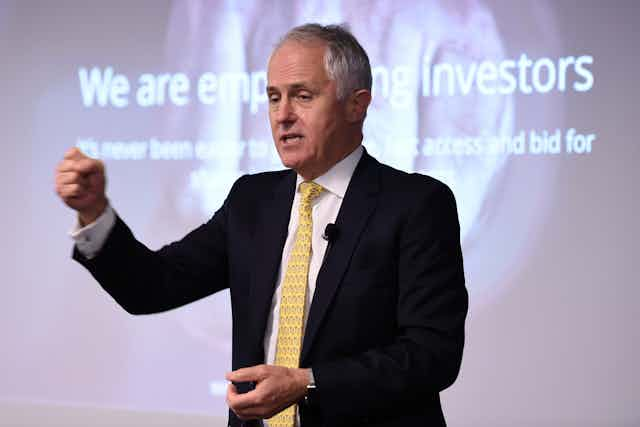Much as we should remain sceptical of politicians proclaiming themselves to be decisive, no-nonsense actors on climate change, the previous prime minister, Tony Abbott, did plenty more than talk. He and his government channelled their lack of political will to address the climate problem into an enthusiastic appetite for “direct action” going well beyond the predictable abolition of the so-called “carbon tax”.
Abbott’s actions were born of an apparent ideological distaste for the whole climate agenda: he wound back the Renewable Energy Target; cut funding to the Australian Renewable Energy Agency (ARENA); and attempted to abolish and then thwart the work of the Clean Energy Finance Corporation (CEFC).
Replacing Abbott with almost anyone would be cause for celebration for anybody who believes the basic science of the global climate problem might be even half right.
But in Malcolm Turnbull we have a figure who lost the leadership of his party because of his position against Abbott on climate. He then crossed the floor of the parliament to vote for the Carbon Pollution Reduction Scheme (CPRS).
Despite having to remain wedded to the existing Abbott-Hunt policies on climate to gain the leadership, anyone who doubts Turnbull’s credentials on climate change should read his 2010 speech. His perspective on why he supported the CPRS displays a deep knowledge and conviction.
Good advice, bad outcomes
It is one of the rarely considered consequences of the sad story of Australia’s national policy response to climate change that many of our finest public servants have wasted years of effort on dutifully serving the demands of their political masters.
More than ten years ago, analysis by then Treasury Secretary Ken Henry under Peter Costello recommended a national emissions trading scheme. The advice was ignored.
In 2006 John Howard asked Peter Shergold, then head of the Department of Prime Minister and Cabinet, to examine the most effective ways to achieve the emissions reductions required. He too concluded that an emissions trading scheme was necessary. But the following year, the incoming prime minister, Kevin Rudd, ignored the advice, wanting to adopt his own approach.
Then, in 2010, Rudd’s CPRS hit the buffers of prime ministerial hubris followed by the disappointing outcome of the United Nations climate summit in Copenhagen. By then, Turnbull had already lost his job as opposition leader over his climate policy stance. With Abbott on rhetorical steroids, the debate deteriorated to resemble a talkback radio slanging match crudely dominated by toxic gesture.
Despite Julia Gillard’s noble efforts as prime minister to achieve some modicum of policy stability and continuity, her government’s initially fixed carbon pricing system was swiftly dismantled by the Abbott government, together with attempts to either abolish or thwart the efforts of new organisations such as the CEFC and ARENA, which were doing important, tangible work and investment.
Don’t look away now
It is a sad and sorry story. Much like looking into a teenager’s bedroom, the temptation is to take a quick, horrified peek and then shut the door on the whole mess.
But we can’t, largely because the issue won’t go away. The decisions taken by Australia’s major allies and trading partners will come to affect our economy whether we like it not. As Bank of England Governor Mark Carney succinctly put it in a recent speech at Lloyd’s of London, “with climate change, the more businesses invest and change with foresight, the less they will regret in hindsight”.
With his talk of “agile” government, Turnbull, the former investment banker, seems to have a similar perspective.
And what is true for businesses is also being recognised by China, India, the European Union and the United States. No longer is climate change a niche concern: it has increasingly become part of the policy and business mainstream.
Turnbull’s ascendancy to the prime ministership is potentially a vital circuit-breaker. From the moment his predecessor came to office, “climate” and “change” were two words that would rarely be heard together in the Commonwealth bureaucracy. With Abbott’s removal, those working in the central agencies, the CEFC and ARENA can breathe a collective sigh of relief and get back to the serious work of developing policy and supporting projects to reduce emissions.
Abbott’s successor has (understandably) gained power on a number of promises, including that the existing Direct Action policy will remain untouched.
But this is no great problem for Turnbull. He knows that effective climate policy must send clear, stable and continuous messages across the economy about the important and economically rational imperative of reducing emissions.
Direct action doesn’t do this. It is relevant only to the businesses that receive public money to do things that otherwise they wouldn’t. It is wasteful, and most likely so costly as to be unsustainable beyond a few years.
With the government committed to its formal UN climate pledge to cut greenhouse emissions by 26-28% below 2005 levels by 2030, Turnbull is going to need new policies to achieve this. And with countries likely to agree in Paris that their commitments should be reviewed on a five-yearly basis, it is almost unthinkable that Direct Action could be funded and sustained as Australia’s flagship climate policy over the longer term.
Assuming that the Paris summit delivers an international climate agreement in December, and that Turnbull pulls off an election victory next year, I predict that soon after we will see a renewed creativity and urgency on climate policy. Set free from the toxic pugilism of Australian climate politics, a Turnbull-led government might finally achieve the sensible national approach that has been analysed to death.
Malcolm Turnbull might just be the adult prime minister who walks into that bedroom and cleans up the climate policy mess left by his squabbling predecessors.
This is an edited and extended version of a blog post published at “Pearls and Irritations”, the blog established by John Menadue, former head of the Department of Prime Minister and Cabinet under prime ministers Whitlam and Fraser.

